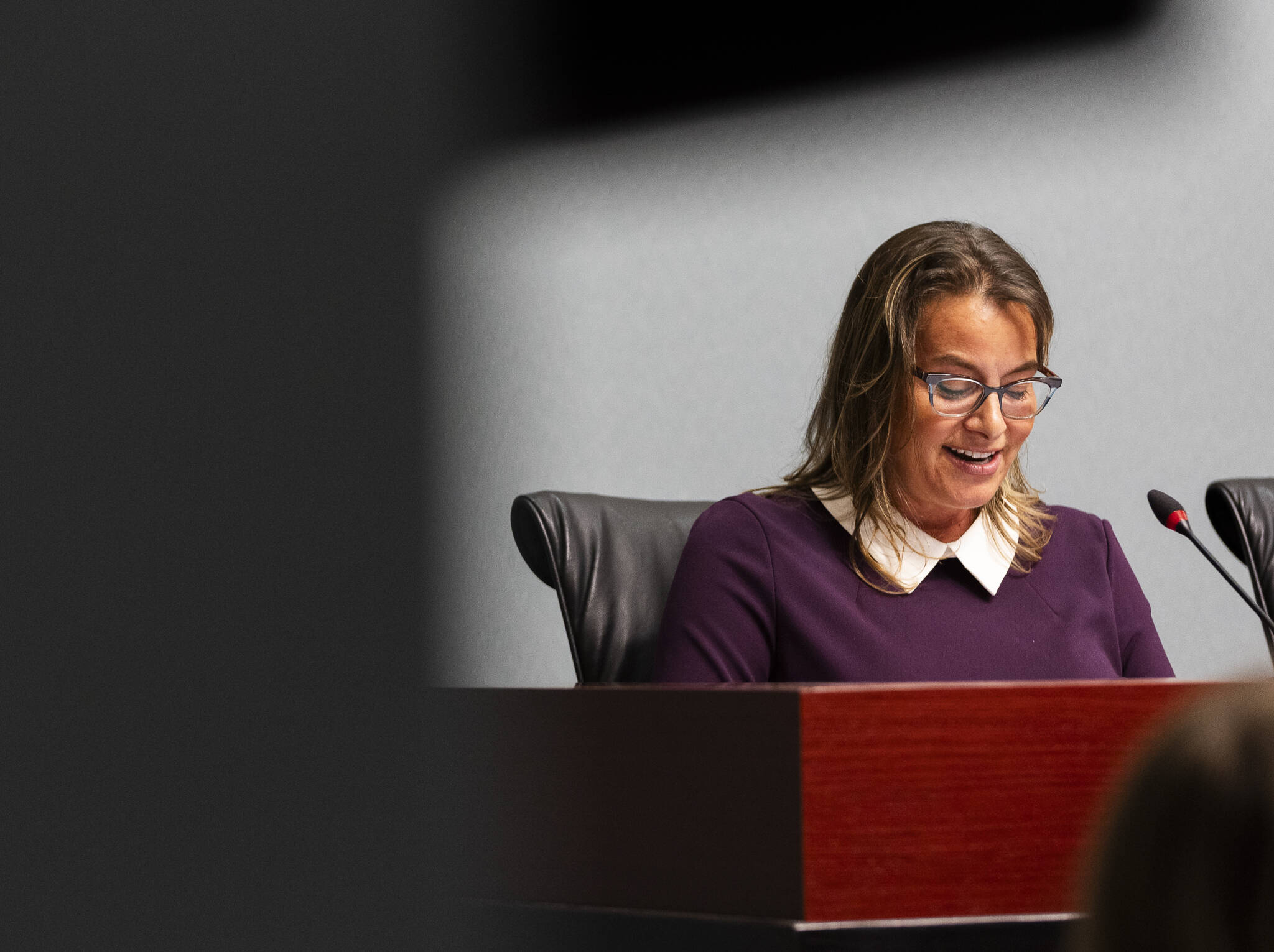EVERETT — Everett will be able to maintain current service levels while balancing a $7.9 million gap in its 2026 budget, the city’s mayor said Wednesday.
In her annual budget address to the City Council, Mayor Cassie Franklin said a freeze on non-essential spending, cutbacks on city grants, suspension of general fund contributions to pension funds and street maintenance were the cost-cutting measures that are set to prevent the looming deficit. The city is also planning to use about $4.8 million in one-time COVID relief dollars — some previously allocated to other projects — to plug funding gaps.
The proposed budget reduces maintenance and operation budgets for departments across the city to the tune of about $200,000, city staff said in a September presentation. It halts about $4 million worth of contributions to LEOFF 1 pension funds, reduces $1 million of general fund contributions to street repair and cuts human needs grants and contributions to Clare’s Place Supportive housing by about $300,000.
During her address, Franklin said the city’s persistent imbalance between expenses and revenues continues to present challenges when budgeting.
“We need to be clear. The structural deficit is real,” Franklin said. “Costs increase every year with inflation, new mandates and population growth, but our most stable revenue source, property tax, can only grow by 1% annually.”
In 2001, voters approved an initiative limiting the amount taxing districts like cities and counties can collect from property taxes. Municipalities can only collect an additional 1% in revenue from property tax each year, lower than the rate of inflation even when the economy is healthy.
For more than a decade, Everett has been battling annual budget deficits. Since Franklin took office in 2018, she’s closed nearly $100 million in cumulative deficits, she said Wednesday, largely from spending cuts and securing grants. Over that time, the city has lost its municipal swimming pool and animal farm and seen its library hours slashed as measures to close the ongoing budget gaps. Other nearby cities, like Lynnwood and Edmonds, face funding challenges as well.
In 2024, the city went to voters with an ask to raise property taxes to fund city services. The measure would have increased the city’s property tax levy rate from $1.52 per $1,000 of assessed value to $2.19 per $1,000, an increase of about $336 per year on the average resident’s property tax bill, according to the city. Detractors of the measure said the city was overspending.
Voters shot the levy lid lift down. That result led to deep cuts in the 2025 budget to close a $12.9 million deficit. Thirty-one city employees lost their jobs; others were furloughed. Library hours were cut further and the city’s park rangers program was cut entirely.
The depth of those cuts meant that the 2026 budget would not require staffing reductions, Franklin had previously said. In the proposed 2026 budget, departments across the general fund largely maintain their existing funding levels.
The proposed budget would not lay off any staff members in the general fund.
The city’s largest general fund expense, by far, remains its police department. The proposed budget allocates $51.8 million toward the police department in 2026, about 29% of the city’s $176.7 million general fund. City spending on police increased significantly in the 2024 budget and has remained steady since.
The general fund pays for essential city services like police, fire, libraries, parks and government operations. It’s funded by a mix of property, sales and business and occupation taxes. Property tax makes up the largest chunk of revenue for the city, followed closely by sales tax.
Non-general government operations like Everett transit, water and sewer utilities, city golf courses and major capital improvement projects, are separate from the general fund. Money for non-general operations come from fees, grants and utility, water and sewer rates. That money can’t be used for general government expenses.
The total proposed budget, including general and non-general government spending, amounts to $612.7 million.
In her address, Franklin highlighted new construction projects set to take place over the next year, particularly related to parks. She said construction will begin on Eclipse Mill Park near the Everett riverfront, a pickleball facility at Forest Park and renovations across other facilities.
The budget also maintains spending on the city’s economic development department, Franklin said, which has grown over her time in office.
As an ongoing balancing measure, Franklin said the city should re-evaluate its policy of pre-funding its LEOFF 1 pension funds, a pension plan available to police and firefighters hired before Oct. 1, 1977. Other cities, she said, pay pension costs on a ‘pay as you go’ model. Everett also halted contributions to that fund in last year’s budget.
Everett may face a budget deficit of $14 million in 2027, city projections show.
Budget deliberations will continue through November.
Will Geschke: 425-339-3443; william.geschke@heraldnet.com; X: @willgeschke.
Talk to us
> Give us your news tips.
> Send us a letter to the editor.
> More Herald contact information.

























